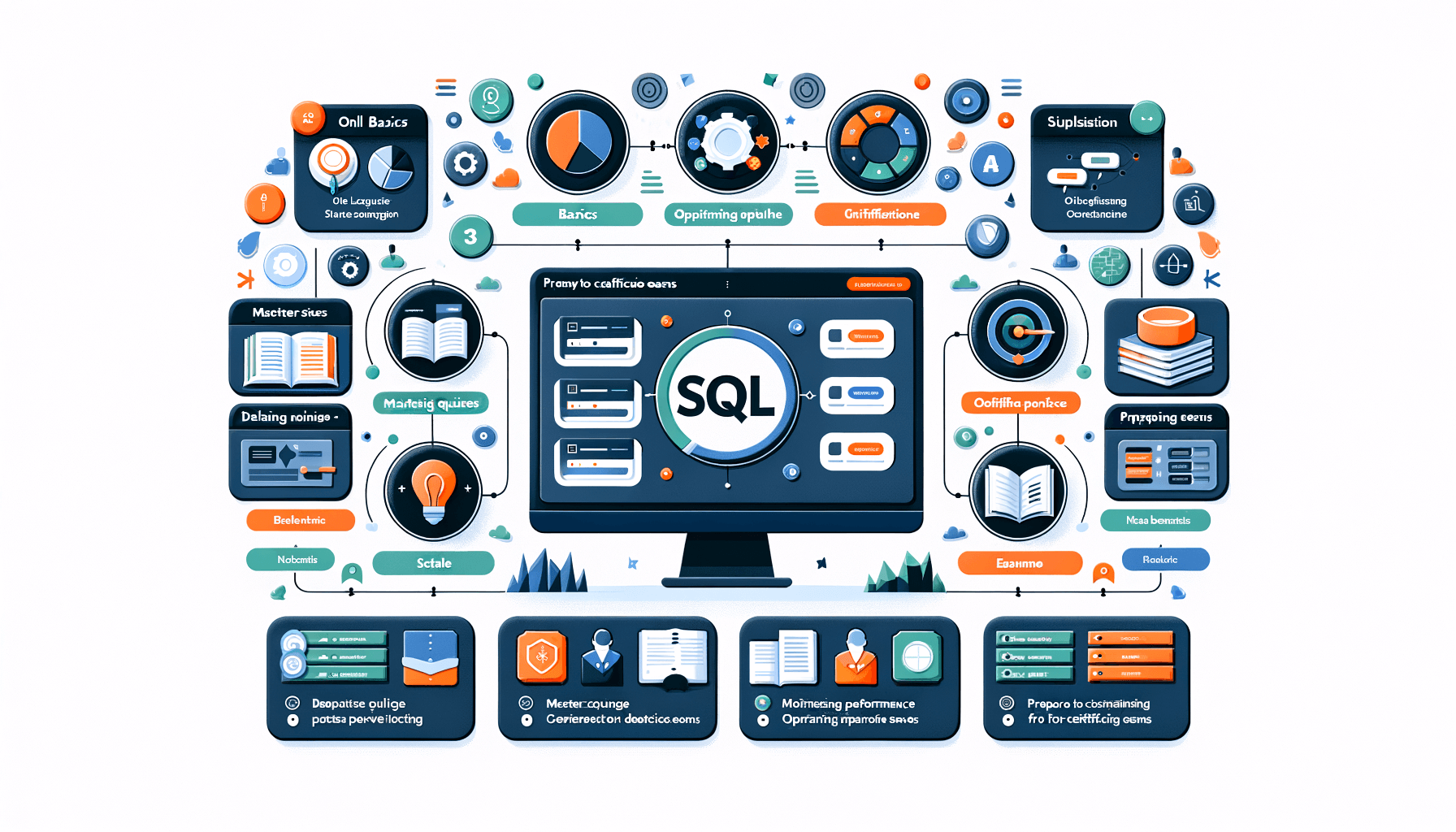A big variety of articles and resources

Learn SQL Queries Online: From Basics to Advanced
 Sia Author and Instructor
Learn SQL
Sia Author and Instructor
Learn SQL
9 minute read
Mastering Basic SQL Queries
Understanding SELECT Statements
The SELECT statement is the foundation of SQL queries. It allows you to retrieve data from one or more tables. Mastering the basics of SQL starts with understanding how to use SELECT effectively. This includes specifying columns, using aliases, and combining data from multiple tables.
Filtering Data with WHERE Clause
The WHERE clause is essential for filtering data based on specific conditions. It helps in narrowing down the results to only those rows that meet the criteria. For instance, you can filter data to find all customers from a particular city or all orders above a certain amount.
Sorting Results with ORDER BY
ORDER BY is used to sort the result set of a query by one or more columns. You can sort data in ascending or descending order, making it easier to analyze and interpret. This is particularly useful when dealing with large datasets where the order of information is crucial.
Understanding these basic SQL concepts is crucial for anyone looking to efficiently learn SQL online. They form the building blocks for more advanced queries and techniques.
Advanced SQL Functions and Techniques
Using Aggregate Functions
Aggregate functions are essential for summarizing data in SQL. Functions like COUNT, SUM, AVG, MIN, and MAX allow you to perform calculations on multiple rows of a table's column. Mastering these functions can significantly enhance your data analysis capabilities. For instance, you can quickly determine the total sales, average order value, or the highest and lowest scores in a dataset.
Implementing Subqueries
Subqueries, also known as inner queries or nested queries, are queries within another SQL query. They are powerful tools for performing complex operations in a single query. Subqueries can be used in various clauses like SELECT, FROM, WHERE, and HAVING. They help in breaking down complex problems into simpler, more manageable parts. For example, you can use a subquery to find customers who have placed orders above the average order value.
Working with Window Functions
Window functions are advanced SQL functions that perform calculations across a set of table rows related to the current row. Unlike aggregate functions, window functions do not cause rows to become grouped into a single output row. Instead, rows retain their separate identities. Common window functions include ROW_NUMBER(), RANK(), DENSE_RANK(), and NTILE(). These functions are particularly useful for tasks like ranking, running totals, and moving averages.
By mastering advanced SQL functions, you position yourself as a valuable asset in business intelligence and data analysis roles. These skills not only improve your ability to handle complex data scenarios but also enhance your overall analytical capabilities.
Optimizing SQL Performance
Indexing Strategies
Indexing is a crucial technique for enhancing SQL performance. Proper indexing can significantly reduce query execution time by allowing the database to quickly locate and access the required data. Here are some key strategies:
- Use indexes on columns frequently used in WHERE clauses.
- Avoid over-indexing, as it can slow down write operations.
- Utilize composite indexes for queries involving multiple columns.
Query Optimization Techniques
Optimizing SQL queries involves several techniques to ensure efficient data retrieval. Some of the most effective methods include:
- Select only the columns you need: Avoid using SELECT * as it can lead to unnecessary data retrieval.
- Use joins instead of subqueries where possible to improve performance.
- Apply appropriate filtering conditions early in the query to reduce the dataset size.
Analyzing Query Execution Plans
Understanding and analyzing query execution plans is essential for identifying performance bottlenecks. Execution plans provide a detailed breakdown of how the SQL engine executes a query. Key steps include:
- Use the EXPLAIN statement to generate the execution plan.
- Look for full table scans, which can indicate missing indexes.
- Identify and address any steps with high cost or long execution time.
Effective SQL performance optimization requires a combination of proper indexing, query optimization techniques, and thorough analysis of execution plans.
SQL for Data Analysis and Reporting
Generating Reports with GROUP BY
The GROUP BY clause is essential for aggregating data and generating insightful reports. By grouping data based on specific columns, you can easily summarize large datasets. This is particularly useful for creating summary tables and dashboards that provide a high-level view of your data.
Using SQL for Data Visualization
SQL can be a powerful tool for data visualization when combined with other technologies like Python or R. You can extract and preprocess data directly within your SQL queries, making it easier to create visualizations that highlight key trends and patterns. Integrating SQL with visualization tools can significantly enhance your data storytelling capabilities.
Creating Complex Joins for Analysis
Complex joins are crucial for combining data from multiple tables to perform comprehensive analyses. Whether you're using INNER JOIN, LEFT JOIN, or RIGHT JOIN, mastering these techniques allows you to build more detailed and accurate reports. This skill is indispensable for any data analyst looking to provide deeper insights.
Database Management with SQL
Designing an efficient database schema is crucial for optimal performance and data integrity. A well-designed schema ensures that data is stored in a logical and efficient manner, reducing redundancy and improving query performance. Key considerations include normalization, indexing, and understanding the relationships between different data entities.
Transactions are essential for maintaining data consistency and integrity, especially in multi-user environments. By using SQL transactions, you can ensure that a series of operations either complete successfully or not at all, preventing partial updates that could lead to data corruption. ACID properties (Atomicity, Consistency, Isolation, Durability) are fundamental principles that guide transaction management.
Ensuring data integrity involves implementing constraints and rules that enforce the accuracy and reliability of the data within the database. Common techniques include the use of primary keys, foreign keys, and unique constraints. Additionally, triggers and stored procedures can be used to automate data validation and enforce business rules.
Effective database management with SQL not only enhances performance but also ensures that your data remains accurate, consistent, and secure. By mastering these techniques, you can significantly improve the reliability and efficiency of your database systems.
Real-World SQL Applications
In the realm of business intelligence, SQL is indispensable for transforming raw data into actionable insights. Mastering SQL allows analysts to create detailed reports, dashboards, and visualizations that drive strategic decisions. For instance, a retail company might use SQL to analyze sales data, identify trends, and optimize inventory management.
SQL plays a crucial role in web development by enabling dynamic data retrieval and manipulation. Web developers often use SQL to interact with databases, ensuring that applications can store, retrieve, and update data efficiently. This is particularly important for e-commerce sites, where real-time data handling is essential for user experience and operational efficiency.
Automation is a key advantage of using SQL scripts in various applications. By writing SQL scripts, developers and data analysts can automate repetitive tasks such as data cleaning, report generation, and data migration. This not only saves time but also reduces the risk of human error, ensuring more reliable and consistent outcomes.
Engaging in exercises and quizzes that reflect everyday analytical challenges with AI assistance can significantly enhance your SQL skills and prepare you for real-world applications.
Preparing for SQL Certification Exams
Overview of Certification Paths
To become a certified SQL professional, it's essential to understand the various certification paths available. Certifications like Microsoft SQL Server, Oracle SQL, and MySQL are among the most recognized. Each certification has its own set of requirements and exams, so it's crucial to choose the one that aligns with your career goals.
Study Tips and Resources
Master SQL skills by leveraging the best online resources to learn SQL. Self-paced courses, interactive tutorials, and comprehensive guides can be incredibly beneficial. Advanced training resources like SQLZoo quizzes and Joe Celko's SQL puzzles are also excellent for deepening your understanding. Free and advanced online courses are available to help you prepare effectively.
Practice Exams and Sample Questions
Taking practice exams and working through sample questions is a great way to prepare for certification exams. These practice tests help you get familiar with the exam format and identify areas where you need further study. Many online platforms offer practice exams that simulate the real test environment, providing a valuable opportunity to gauge your readiness.
Remember, the importance of mastering SQL for data-related questions and database management cannot be overstated. Consistent practice and thorough preparation are key to success in certification exams.
Preparing for SQL Certification Exams can be a daunting task, but with the right resources, you can achieve your goals. Our comprehensive courses are designed to help you master SQL and advance your career. Visit our website to explore our course catalogue and find the perfect course for you. Sign up today and start your journey towards becoming a SQL specialist!
Conclusion
Learning SQL online offers a flexible and comprehensive pathway to mastering one of the most essential skills in today's data-driven world. From foundational concepts to advanced techniques, online courses provide a structured and supportive environment for learners at all levels. Whether you're a beginner looking to understand the basics or an experienced professional aiming to refine your skills, the diverse range of available resources ensures that you can find a course tailored to your needs. By engaging in hands-on projects, real-world problem-solving, and interactive exercises, you not only gain theoretical knowledge but also practical experience that can be directly applied in your career. Embrace the opportunity to learn SQL online and unlock new possibilities in data management, analysis, and beyond.
Frequently Asked Questions
What are the prerequisites for learning SQL?
Basic knowledge of computer operations and understanding of databases can be helpful, but many courses start from scratch.
How long does it take to learn SQL?
The time required to learn SQL varies depending on the complexity of the topics and the learner's pace. Generally, it can take a few weeks to a few months.
Can I learn SQL online for free?
Yes, there are many free resources and courses available online to learn SQL, including introductory lessons and tutorials.
What are some common uses of SQL?
SQL is commonly used for data manipulation, querying databases, generating reports, and data analysis in various industries.
Is SQL useful for data analysis?
Absolutely! SQL is a powerful tool for data analysis, allowing users to efficiently retrieve, manipulate, and analyze data from databases.
Do I need any specific software to practice SQL?
You can practice SQL using various database management systems (DBMS) like MySQL, PostgreSQL, SQL Server, or even online SQL editors and sandboxes.
Related Articles

Is It Easy to Learn SQL? A Beginner's Guide to Mastering SQL
10 minute read

Learn SQL Free Online: Your Path to Data Mastery
9 minute read

Learn SQL Language Free: A Comprehensive Tutorial
8 minute read


